Welcome to week five, online guide to everything HtTAJwBTG. We will begin with weeks one to four’s presentation notes, and then at the bottom I will provide a link for further study. Hope to see you join us in person next week! Thank you for joining us for week two. We will begin by reviewing last week’s content.
Welcome to our five week review.
Let’s begin by reviewing some summary note from week one – three
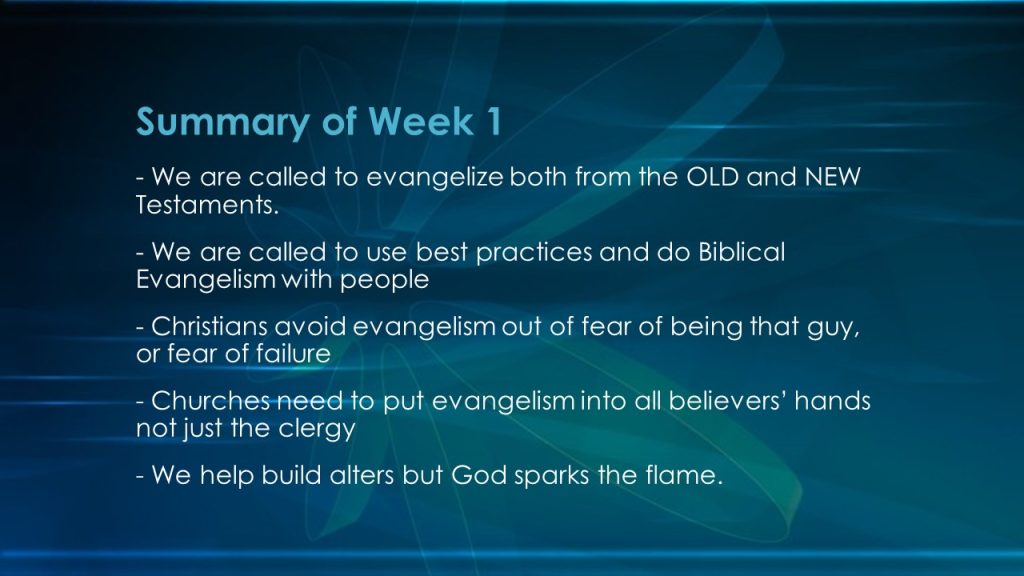
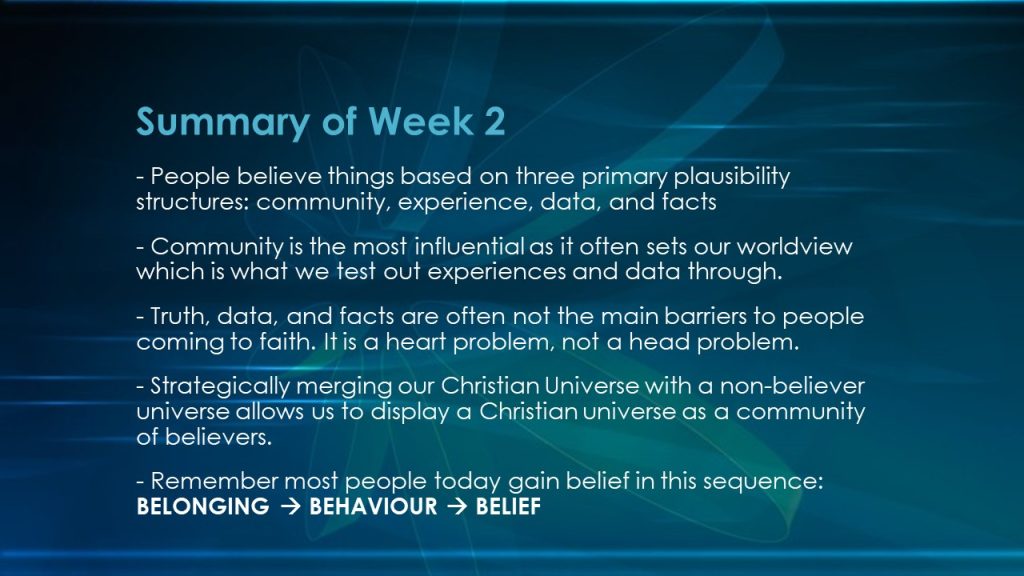
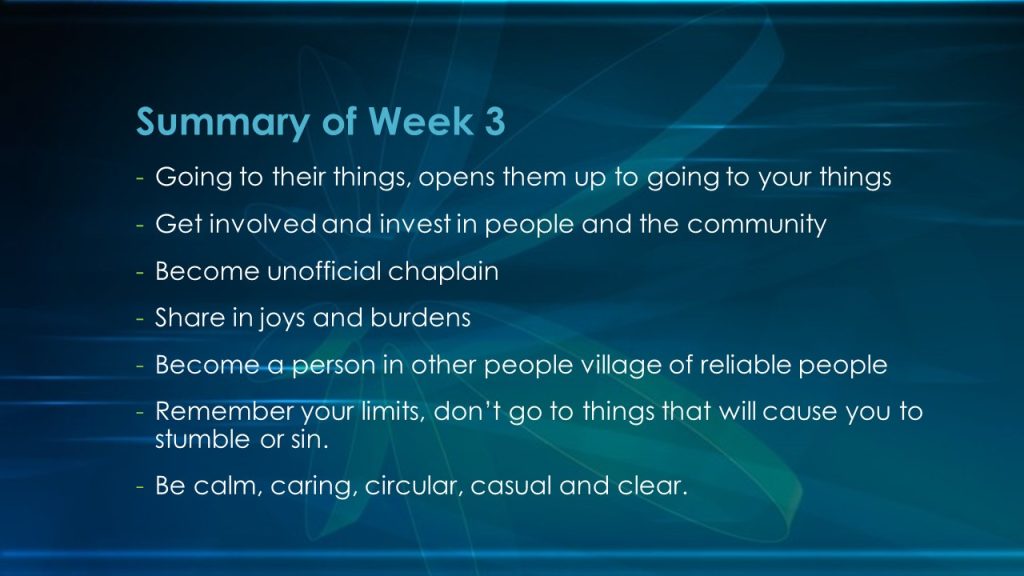
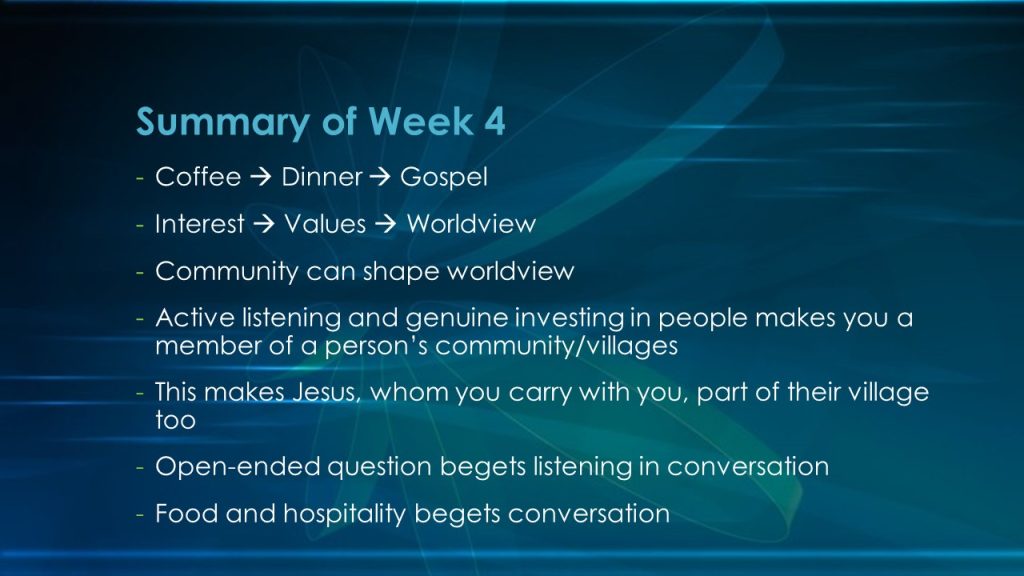
As we can see, in just a few short weeks we have covered a lot of material. Though we have covered much, none of this is rocket-science. Most of this is common sense combined with a genuine desire for human connection. Why we apply this to faith and sharing faith, it gives us the building block for evangelism. Today we will focus in on listening.
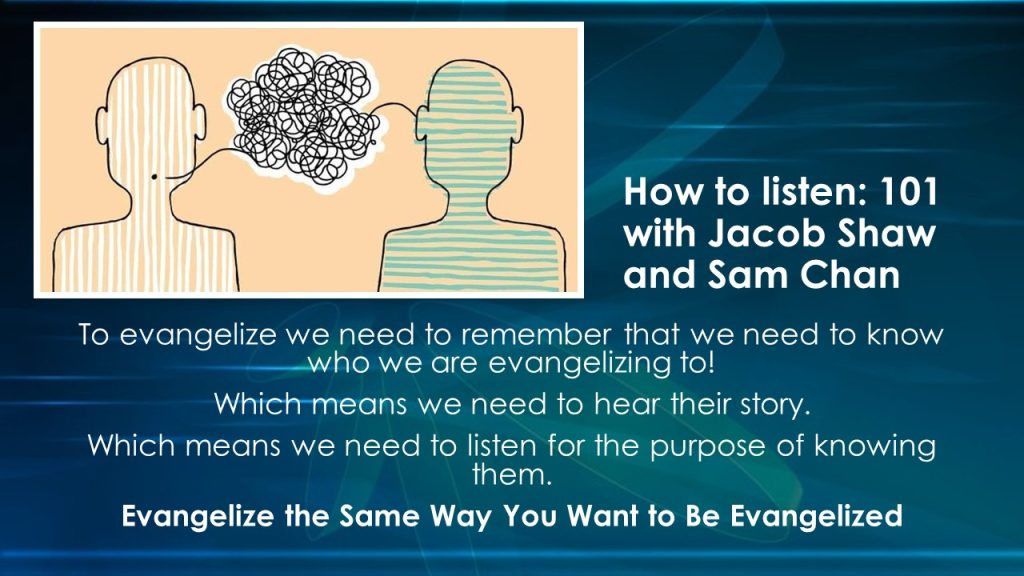
Listening is so important for the evangelist to understand and practice well. Listening is a skill that can be hard to learn. Many people think they are good listeners.

There is always chance when engaging with someone in conversation that hostility will arise. When you want to talk about Jesus, sometime those hostilities can be at the faith, at Christians, and/or at Jesus, and even though we want to get defensive to protect Jesus, remember your job is to listen first. Be willing to hear their frustration and anger, find out why they are hurt, show empathy and understanding, and it will bridge you and them closer.
When I was a young adult, I work for a time for American Express (AE). My job was to call businesses and see if they would be a good fit for one of the business cards. The one thing I really admired about this job, was this was not a sale job where AE wanted us to just get a card out to ever business, rather, AE wanted to make sure a business would benefit from the card. We were encourages to talk with the owners of businesses to see if their suppliers and other purchases for their business would generate rewards from the AE card program. If a business owner’s business wasn’t a good fit, we weren’t suppose to push the card, AE business department wanted successful customers. To find out if a business was a good fit, we had to ask questions, what did their business purchase week to week, month to month, who were their suppliers, what perks did the owner hope to get, they the owner hope to carry a credit balance or not. Some of the skills I have for pastoral care and evangelism came from working this job.
Before I began working for AE, I had been in University and done a few pastoral care courses, and I would often apply what I had learned about actively listening my calls. I remember one time a woman had a payment error with her AE card, she had paid too much by mistake on to her personal account, and she was very stressed out, she didn’t know how to get the money back. I only discover this because I cold-called her business. When she answered the phone and I told her why I was calling she began the call very upset, but even though it wasn’t my department I invited her to share her story. I told her I wasn’t the expert to help her with this, but I looked up all the right people for her to contact and I walked her through who to reach out to. After a few days I called her back, she had gotten her money back, and then as a business owner she was so grateful that I took the time to listen and help, she agreed to get a card for her business. I took a irate call and turned it into a business opportunity because I listened to her first.
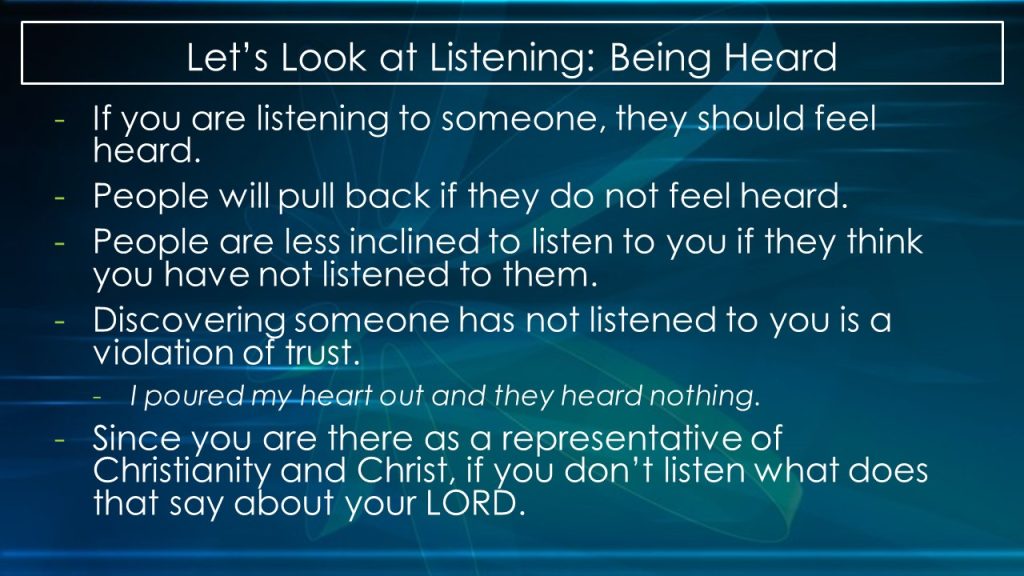
We don’t always realize that people learn much from what we don’t say. If someone speaks to us and shares something, if our response is void of caring or empathy, it tells people that we are not invested in them as a person. We need to be mindful of how we conduct ourselves as listeners. Let’s look at the three forms of listening, the third form is the best for evangelism.
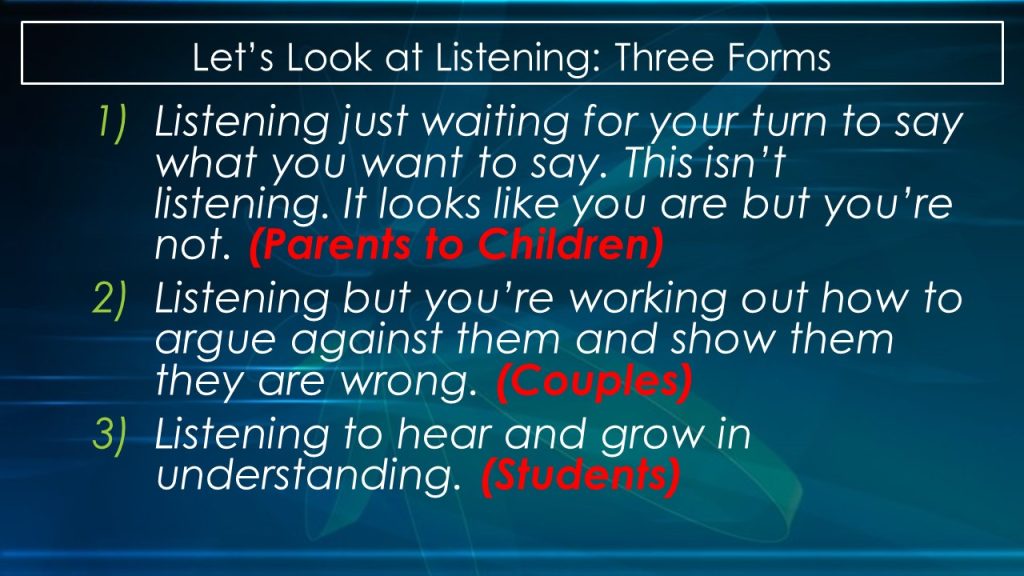
You will see in red examples of the form of listening. These are not necessarily good things to do, rather common examples of when these things happen. For example, form 1 is listening just for you turn to day what you want to say. I discover sometime I do this with my children, especially my toddler, as my toddler will often talk for the sake of talking, because it is a new skill for him. I sometimes can understand what he is saying, or he is just rambling about random things, I’m listening casually, and when I need him to do something, like get ready to leave the house for a car trip, I sometime am not full listening but planning on how to get him out the door, but pretend he has my full attention. This is not the best parenting move, but sometime stress and timelines default a person here. Now when my first born started to age out of toddlerhood, and his sentences started to carry more weight, continuity, and meaning, I could no longer divide my attention, I had to listen because he needs to know when he talks I and present. Even if his sentences are sometime still toddler-ish, this is when is building a cognitive trust in his father to hear and relate to him. Some people unfortunately stay in the early toddler stage with their kids, never really hearing their kids, just waiting for the time to speak at the children. And people do this outside of the parent child dynamic too.
Form 2, is listening to make an argument. This can be some what healthy if it confined to a good and honest academic debate. Put most of this time it happens when people joust for power, and I think a good example of this is couples. Often couples will argue, and they learn to use things against each other as weapons. I remember when my wife and I were first learning to live together, we had both studied fields that practiced active listening, but we were using this listen as weaponry in our arguments. We each had a laundry list a mile long of infractions that the other had said or done. Couples, and especially married couple are to serve and love each other, not keep records of wrongs. Sure we can be called by God to rebuke, but we cannot properly rebuke unless we are first willing to listen. Listening must come first as it humbles us into a reminder that we are their not to win an argument but rather for the wellbeing of another’s life and soul.
The last form is to hear and understand. This one i think is clear enough, but I added the reference of the student. Now maybe i should say a “student with a love of learning”. When you don’t like learning, being a student is hard, but when you love to learn, being a student is easy. Love to listen, love to learn about people, love to know their story.
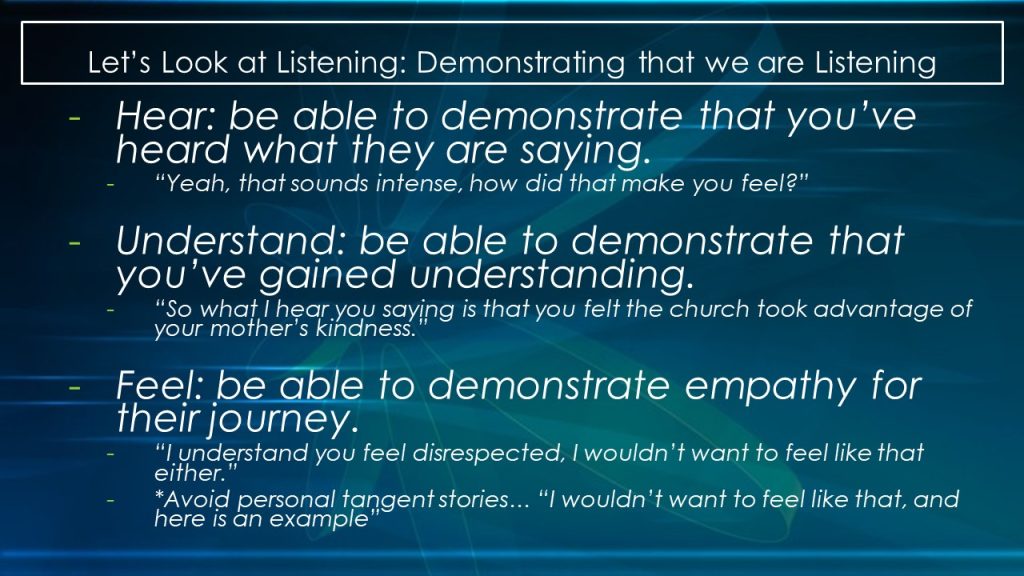
Above are some example on how you can let someone know you hear them, without you taking over the conversation. We need to show that we hear, understand and can feel/empathize for the person we are listening too.
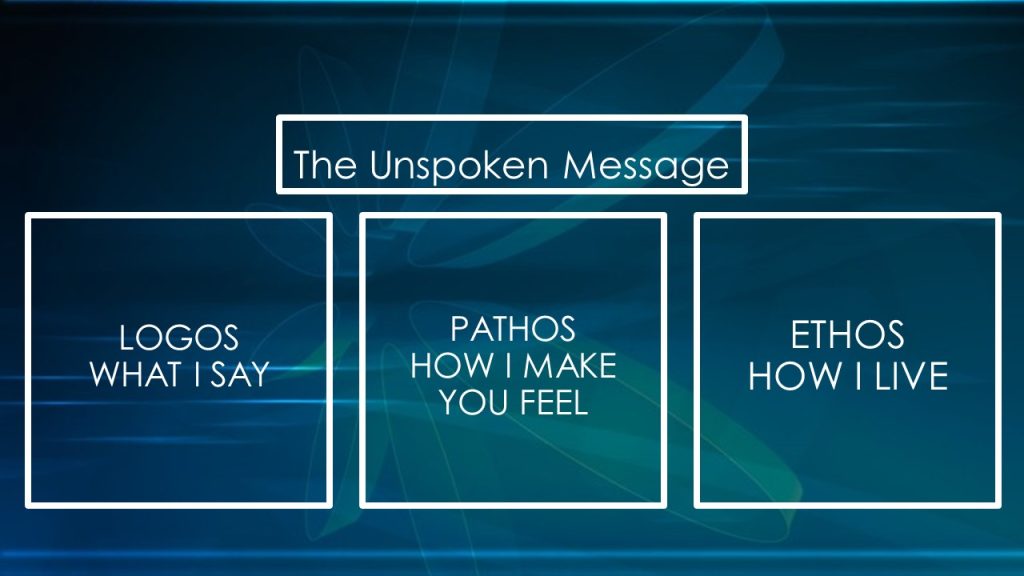
When we listen with our whole selves we demonstrate that our conversation with a person is embodied in our faith. People act out what the believe, if you believe once you leave your house their would be no gravity and you would float up into space and die, you’re not going to leave your house unless your suicidal. We we don’t embody compassion and empathy in what we say, how we make people feel, and how we listen and share into our relationships, then people will assume that those conversation serve another purpose.
We I called that lady for AE, are first her believed I was calling for a SALE only, when i demonstrated through my words, how i made her feel welcome and safe, and what i was willing to do to follow through, her perception of me changed for SALE HUNGRY COLD CALLER to nice guy who cares about his clients.
One of the reason people don’t like “THAT Guy” who talks about Jesus, is because “THAT guy” comes across as having a negative motive or belief behind what they are doing.
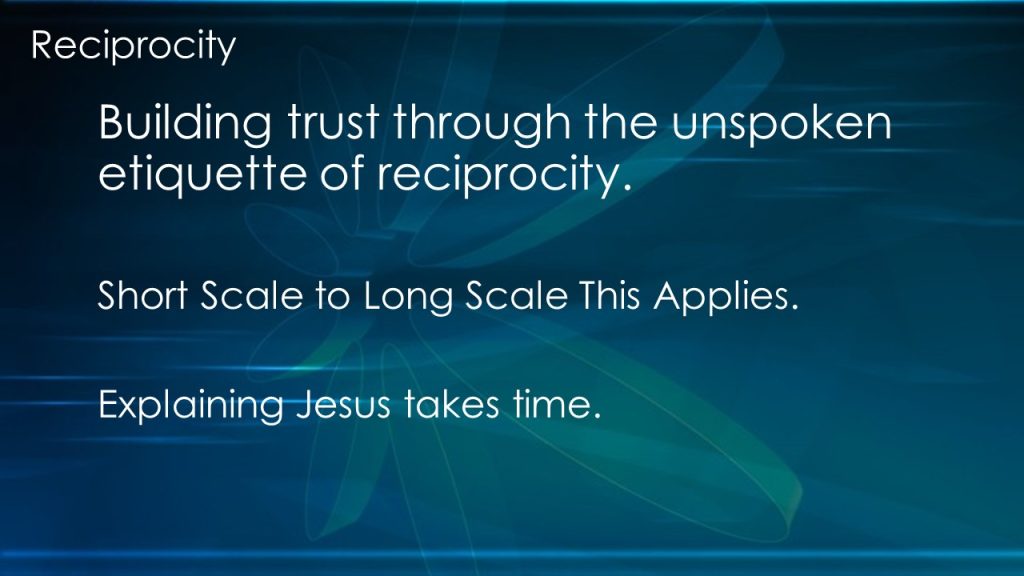
Now behind our listening there is one motive outside of the general concern and love we have for people, which is reciprocity. We want to invest our listening time into people, so they too will reciprocate and invest time into listen to us. When they invite us to speak, Jesus is a part of our story.
Some home work for this week, should be simple enough for you to do, as it is a repeat from last week, but this week focus in on the active listening zone; hear, understand and empathize.
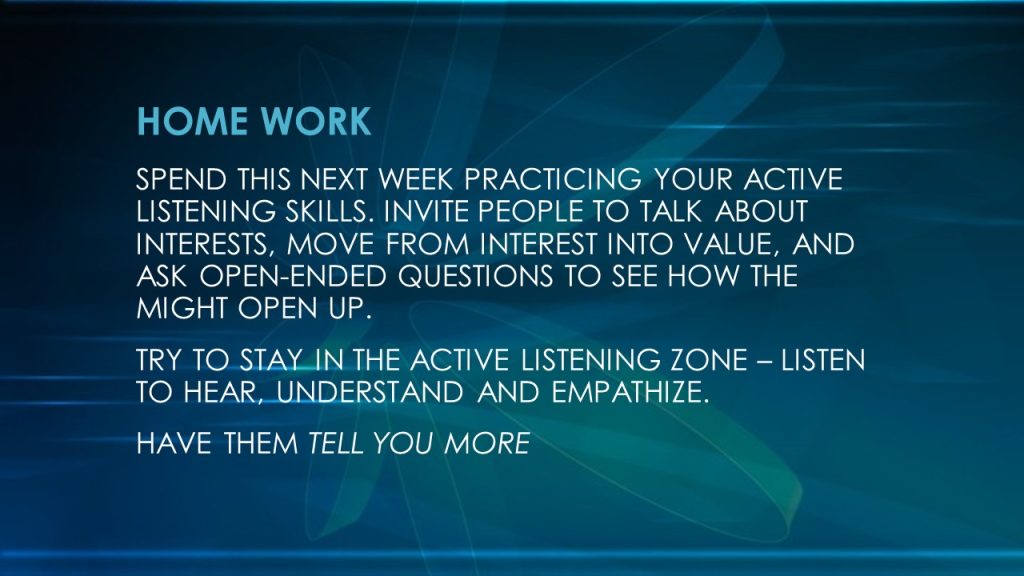
Thank you for joining us online here today to review the lecture material from March 14, for more reflection on Merging your Universes from the themes of Sam Chan’s book, please follow this link –> Here (please note that the reflection found via this link is connected with a past program held by Villages United Church in Granton ON.)
Hope to see you next week either online or in church. GOD BLESS
Leave a Reply